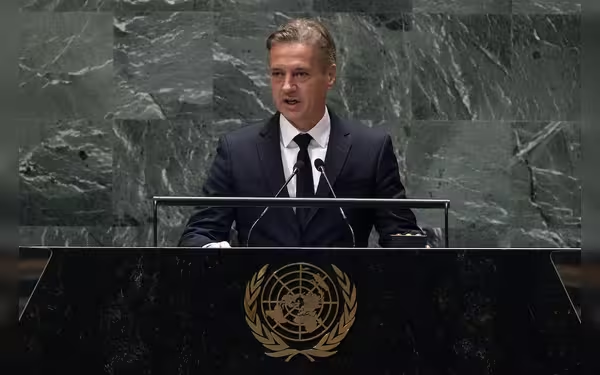Saturday, November 16, 2024 05:44 PM
Slovenian PM Urges Immediate Ceasefire in Gaza
- Slovenian PM calls for ceasefire in Gaza.
- Escalating violence threatens peace in the region.
- Humanitarian crisis in Gaza demands urgent action.
 Image Credits: arabnewspk
Image Credits: arabnewspkSlovenian PM Robert Golob calls for an immediate ceasefire in Gaza, highlighting the urgent humanitarian crisis and escalating violence in the region.
In a powerful address at the United Nations General Assembly, Slovenian Prime Minister Robert Golob made a passionate plea for an immediate ceasefire in Gaza, urging Israeli Prime Minister Benjamin Netanyahu to "stop this war now." This call comes amid escalating violence and humanitarian crises in the region, which have drawn international attention and concern.
During his speech, Golob emphasized the urgent need to halt the bloodshed and suffering in Gaza, stating, "I want to say this out loud and clear to the Israeli government: Stop the bloodshed, stop the suffering, bring the hostages home and end the occupation." His remarks reflect a growing frustration with the United Nations Security Council's (UNSC) inability to effectively address major conflicts, including those in Gaza, Ukraine, and Sudan.
Golob pointed out that nearly four months have passed since the UNSC's resolution calling for a ceasefire and the release of hostages, yet no progress has been made. He highlighted the dire conditions faced by the people in Gaza, describing their existence as one filled with despair, surrounded by "lakes of sewage, piles of rubbish and mountains of rubble." The Slovenian Prime Minister's words resonate with the reality that many in the region are living in constant fear and uncertainty.
Furthermore, Golob addressed the escalating violence in the West Bank and East Jerusalem, warning that the situation is reaching a boiling point. He expressed concern that the ongoing crisis is moving the region further away from a peaceful two-state solution, where Israelis and Palestinians could coexist in harmony. He stated, "The region is on the brink of an abyss. De-escalation is urgently needed, starting with the ceasefires in Gaza and Lebanon." This statement underscores the critical need for immediate action to prevent further deterioration of the situation.
In addition to the crisis in Gaza, Golob shed light on the civil war in Sudan, describing it as a "man-made humanitarian catastrophe" that has displaced millions and left them in desperate need of aid. He criticized the five permanent members of the UNSC for misusing their veto power, prioritizing national interests over global humanitarian needs. Golob called for a reformed council that better represents the international community, particularly underrepresented regions like Africa.
Golob also raised concerns about the erosion of respect for international humanitarian law, noting that humanitarian workers in Gaza have increasingly become targets. He stated, "In Gaza, humanitarians aren’t just occasional collateral victims — they seem to have become a deliberate military target." This alarming trend highlights the challenges faced by those trying to provide aid in conflict zones.
On the topic of climate change, Golob pointed out that those suffering from armed conflicts often lack access to basic necessities like clean drinking water. He remarked, "Unfortunately, people suffering from armed conflicts don’t have the luxury of high-tech solutions." This statement serves as a reminder that while technological advancements are crucial, they do not address the immediate needs of those affected by war.
In a poignant moment, Golob shared his encounter with two young Palestinian girls who expressed their dreams and aspirations despite the destruction surrounding them. He said, "They just had this enormous wish to live a normal, decent life." This highlights the resilience of youth in the face of adversity and the importance of supporting their hopes for a better future.
Prime Minister Golob's address at the UN serves as a clarion call for immediate action to address the humanitarian crises in Gaza and beyond. His emphasis on the need for a ceasefire, respect for international law, and a reformed UNSC reflects a growing consensus that the international community must come together to find solutions to these pressing issues. As the world watches, it is crucial that leaders prioritize peace and humanitarian aid, ensuring that the voices of those affected by conflict are heard and acted upon.













